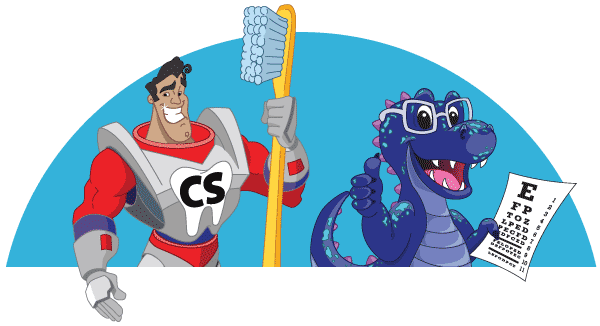Vision
When should kids go to the eye doctor?

As parents, you want to set your children up for success in every way possible, and this includes taking care of their eyes from an early age. So, at what age do kids go to the eye doctor? It’s best to start preventive eye care early in life. Eye exams are not just for determining whether or not your child needs glasses. Eye problems that begin at a young age can have long-term impact. It is important to receive preventive eye care in order to identify potential problems early on and prevent minor issues from becoming serious.
Babies and toddlers cannot read an eye exam chart, so when do kids need to go to the eye doctor?
When should kids go to the eye doctor?
As a part of regular checkups, pediatricians perform limited eye examinations for children. These exams look for abnormalities in the light reflex from the pupil, in the ocular alignment, and in the external aspects of the eyes. However, eye doctors recommend that children receive a comprehensive eye exam by an eye care professional before they turn 1 years old and once again just before kindergarten. Additional visits can be scheduled if your child presents any noticeable eye problems.
For children who have a parent or sibling with a major eye problem such as strabismus or amblyopia, early comprehensive examinations are very important. Visiting the eye doctor is also important if you are concerned that your child may have an eye issue or if the pediatrician detects an eye problem. However, even children without obvious symptoms can still benefit from a visit to the eye doctor because not all eye problems cause symptoms that can be easily observed by parents or guardians. Undiagnosed abnormalities or issues can lead to vision loss, but some of the problems can be reversed if treated early.
What to Expect During Your Child's Visit to an Eye Doctor
For your child’s visit to the eye doctor, bring an up-to-date insurance card, the information for your Primary Care Physician, a co-payment if required by insurance, and any relevant medical records. Before your appointment, you will fill out a complete medical history form.
The exam begins with a discussion of your child’s medical history and is followed with an initial evaluation that includes testing your child’s vision. The doctor will tailor the examination to the medical history, age, interest, and ability of your child.
After the initial vision test, and if needed, the provider will give your child eye drops to dilate the pupils. In some cases, eye doctors use a spray instead of drops. The solution allows the doctor to shine a light into your child’s eye without the pupil reducing in size. This dilation allows the doctor to assess the insides of the eye. It typically takes about 30 minutes for the drops or spray to work. Once the pupils are dilated, the doctor shines a light into your child’s eyes and examines the focus of the light that is reflected through the eyes. The doctor will hold different lenses in front of the eye until the focus is correct. The power of the proper lens will help the doctor determine whether or not your child needs glasses. The eye drops or spray can impact your child’s ability to focus, especially on things close up, so it is important to take it easy for a few hours after the exam.
What kind of eye doctor does your child need?
Your child needs to visit an eye doctor who has received special training to treat children. Optometrists are eye doctors, and some receive additional training to learn to take care of children’s eyes. Optometrists who have specialized training to treat pediatric patients employ kid-friendly tools and techniques to assess eye health in young patients. Even if your child hasn’t learned to talk or read, the optometrist can still perform an assessment, identify potential problems, and prescribe glasses if needed.
Book an Appointment with Us
With a kid’s eye doctor, your child’s future is clear! Regular eye exams are an essential part of keeping babies, kids, and teens on track for educational, social, and developmental success. Children with vision issues often have trouble in school, with sports, in social relationships with peers, and with daily functioning. A vision check-up is a great way to keep your child on track for success.
For your child’s next eye doctor visit, book an appointment at a convenient location near you.
Colorado
Adventure - Aurora, Denver, Commerce City, Greeley, Lakewood, Longmont
Academy Kids - Colorado Springs, Pueblo
Kansas
Adventure - Kansas City, Topeka, Wichita
Maryland
Adventure - Baltimore, Essex, Landover Hills
New Mexico
Adventure - Albuquerque, Santa Fe
Oklahoma
Adventure - Midwest City
Pediatric Dental Care - Tulsa
Washington DC
Adventure - DC, Landover Hills

